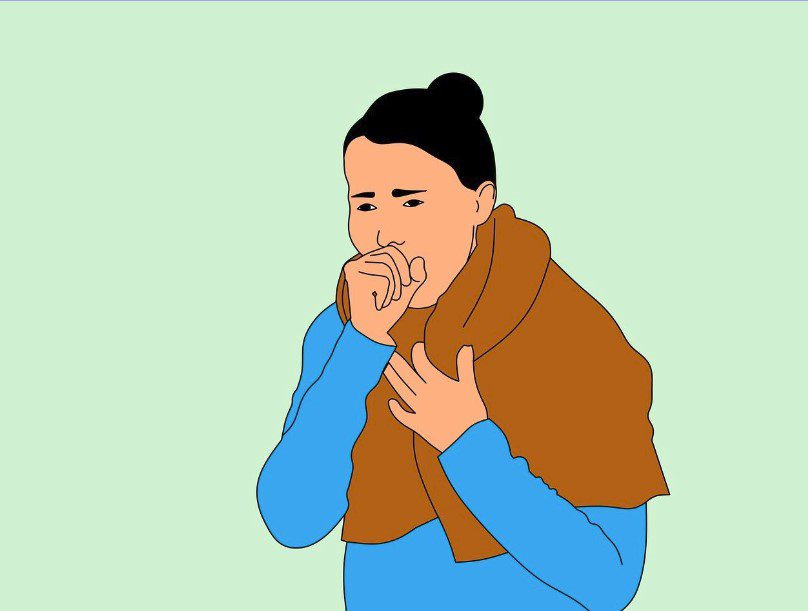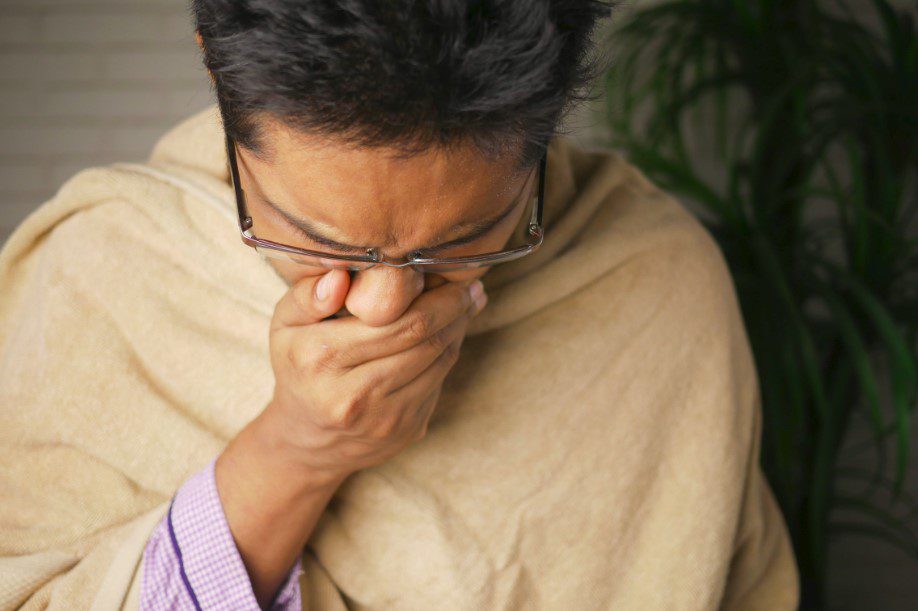The arrival of the flu season often brings with it an unwelcome companion – nighttime coughing. Whether you’re a concerned parent tending to a sick child or an adult grappling with the discomfort of flu-related symptoms, those persistent coughing fits during the night can be annoying and exhausting.
This bothersome symptom can disrupt the much-needed rest and sumptuous sleep, and leave you feeling exhausted and irritable.
But what exactly causes an individual to cough uncontrollably at night when down with the flu?
Well, here are TWO major reasons:
1. The Role of Inflammation in Nighttime Coughing:
Coughing is a common symptom during the flu, and the result of the body’s natural defense mechanisms. It is designed to clear the airways of irritants and mucus.
When a person is down with the flu, the virus wreaks havoc within the respiratory system, and this havoc includes the inflammation of the airways. This inflammation is what makes coughing sound so bad at night.
Well, the body’s immune response to the flu is a double-edged sword. On one hand, it’s essential for combating the virus, but on the other, it can trigger inflammation, particularly in the throat and bronchial passages. As a result, your body prompts you to cough, attempting to clear the airways of irritants, mucus, and other debris caused by the infection.
In addition, during the night, when the body is at rest and you lie down, the accumulation of mucus and phlegm in the airways can become more pronounced. This can lead to heightened irritation, prompting more frequent and intense coughing episodes.
It’s worth noting that the flu virus can also stimulate an increase in mucus production, which further exacerbates the need to cough. This combination of inflammation and excessive mucus production is a formidable duo responsible for the nighttime coughing!
… Nasal Drip and Postnasal Drip
Another common factor contributing to nighttime coughing during the flu is nasal drip. When you have a runny or stuffy nose, the excess mucus can drip down the back of your throat, leading to irritation and coughing. Postnasal drip, as it’s often called, tends to worsen when you lie down, which is why it becomes more noticeable at night.
2. The Role of Environmental Factors in Nighttime Coughing:

It is not just the internal factors that play a pivotal role in nighttime couging. External environmental factors can also significantly contribute to this discomforting symptom, especially during the colder months when the flu is most prevalent.
– Dry Air and Coughing
One of the primary environmental factors that can worsen nighttime coughing is dry air. Where relevant when winter sets in and indoor heating systems kick into high gear, the air in the house becomes increasingly parched.
This dry indoor air can be particularly harsh on your respiratory system, leading to throat and airway irritation. Dry air can exacerbate the already inflamed airways caused by the flu, intensifying the urge to cough.
Moreover, the dry air can make mucus in your airways thicker and more stubborn to expel. This, in turn, leads to more forceful coughing, especially at night when you are lying down. The constant need to clear your airways can make it challenging to get a peaceful sleep the body craves during a flu episode.
– Air Conditioning and Central Heating Systems
In regions with hot climates or temperate weather year-round, the extensive use of air conditioning and central heating systems is a common practice. These systems are designed to regulate indoor temperatures for comfort, but they often have a side effect: they can dry out the air.
Air conditioning units and heaters remove moisture from the air as they function, creating indoor environments that may not be as humid as they should be.
As a result, even in countries without winter, people can experience dry indoor air, which can irritate the throat and airways. This irritation can intensify nighttime coughing when an individual is already down with the flu.
– Artificial Heating Sources
In some regions, especially those at higher altitudes or with extreme temperature variations, artificial heating sources like space heaters are used to keep indoor spaces warm. These heaters can have a significant drying effect on the air, much like central heating systems.
This dry air can lead to the same respiratory discomfort, making coughing worse, even in areas where winter isn’t a factor.
Other Possible Causes of Nighttime Coughing:

Circadian rhythm: Your body’s circadian rhythm, or internal clock, plays a role in many bodily functions, including immune function. Your immune system is more active at night, which can lead to increased inflammation and coughing.
Cough Reflex: Coughing is a natural defense mechanism to clear the airways of irritants and mucus. At night, when a child is lying down, mucus and postnasal drip can accumulate in the throat, leading to increased coughing.
Croup: Croup is a common respiratory infection in children that causes inflammation of the larynx (voice box) and trachea (windpipe). Croup can cause a barking cough that is often worse at night.
Bronchitis: Bronchitis is an inflammation of the bronchi, the tubes that carry air to and from your lungs. Bronchitis can cause a wet cough that produces mucus. Bronchitis can occur on its own or as a complication of the flu.
Tips for Relieving Nighttime Coughing During the Flu

1. Drink Plenty of Fluids
Staying well-hydrated is essential when you have the flu. Healthy hydration can help thin mucus and make it easier to cough up. Drinking plenty of fluids helps keep your throat and airways moist, reducing irritation and coughing. Opt for warm herbal teas, clear broths, and water to soothe your throat and prevent dehydration.
2. Eat and Drink Correctly!
To suppress a nighttime cough, consume soothing foods and drinks like honey, ginger, turmeric, lemon, warm soup, herbal tea, garlic, oatmeal, and bananas. Stay hydrated with warm water. Avoid cold drinks, caffeine, and spicy foods.
3. Elevate Your Sleeping Position
To alleviate nighttime coughing, consider elevating the head of your bed or using extra pillows to prop yourself up. Sleeping at a slight incline can help reduce postnasal drip and ease the coughing associated with it.
4. Use a Humidifier
To counteract the adverse effects of dry indoor air, maintaining optimal humidity levels in your living space, and bedroom in particular, is essential. When the air is adequately humid, it helps soothe the respiratory passages, reducing irritation and the need to cough.
Using a humidifier in your bedroom can be a game-changer. It adds moisture to the air, creating an environment that is gentler on your airways. This simple adjustment can help you get through the night with less coughing and more restful sleep.
What is humidity?: Humidity is like the amount of water that’s in the air around us. When we talk about humidity, we’re talking about how damp or dry the air feels. Imagine you’re outside on a really hot day, and you’re all sweaty. That’s because the air is humid, which means it has a lot of water in it.Now, on a cold, dry winter day, the air doesn’t have much water in it, so it feels dry. You might notice your skin gets dry or your throat feels scratchy.
Humidity is measured in percentages. In a bedroom, an ideal humidity range is between 30% and 60%. Good bedroom humidity is typically around 30-50% as it provides comfort, prevents dryness, and inhibits mold growth. Humidity levels below 30% can cause dryness, while levels above 60% can create discomfort and promote mold. Monitoring and adjusting humidity in the bedroom using devices like humidifiers and dehumidifiers can help maintain an optimal environment for sleep and health.
5. Use Cough Suppressants
Over-the-counter cough suppressants can be effective in minimizing nighttime coughing. Look for products containing dextromethorphan and guaifenesin, which can provide relief from persistent coughing.
However, always follow the recommended dosage and consult a healthcare professional if you have any concerns.
6. Inhale Steam
Steam inhalation is a time-tested remedy for soothing coughing and congestion. You can create a steam tent by leaning over a bowl of hot water with a towel draped over your head. Inhaling the steam can help open your airways and reduce nighttime coughing.
7. Consult a Healthcare Professional
If your nighttime coughing persists or worsens, it is important to consult a healthcare professional as soon as possible. They can assess your symptoms, rule out any complications, and recommend appropriate treatments where necessary. You may need prescription medication, such as an antiviral drug or antibiotics.





Leave a Reply